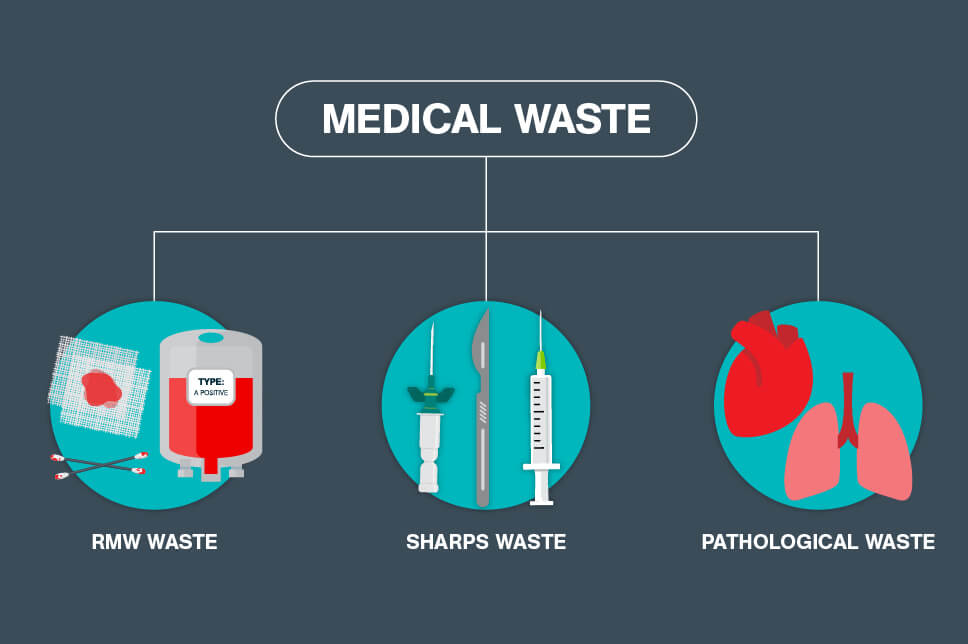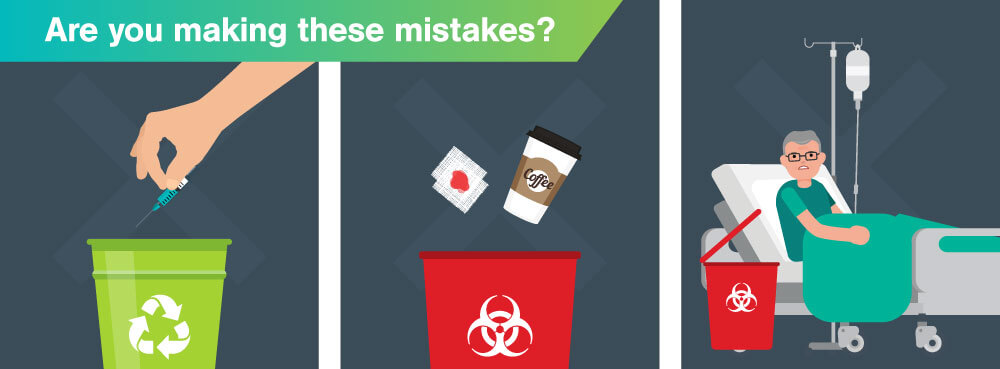Ensuring Safe Handling and Disposal of Medical Waste
Making certain safe handling and disposal of clinical waste is of extremely important relevance in medical care settings. Inappropriate administration of medical waste can position significant risks to the environment, public health, and medical care employees. This requires adherence to rigorous standards and procedures for its secure handling and disposal. In this introduction, we will certainly explore the value of correct medical waste management, the risks connected with inappropriate handling and disposal, along with the standards and methods that can be implemented to ensure its risk-free disposal. Additionally, we will talk about the relevance of training and education for health care experts in order to maintain a clean and secure healthcare environment. By complying with these techniques, we can effectively minimize the possible risks related to clinical waste.
Value of Appropriate Clinical Waste Management
Appropriate clinical waste management is of utmost relevance in guaranteeing the safety and wellness of health care experts, people, and the basic public. Medical waste refers to any type of waste produced by healthcare centers throughout the diagnosis, treatment, or immunization of animals or people. This waste can position significant wellness dangers if not managed and dealt with effectively.
One of the main reasons that proper clinical waste monitoring is vital is to avoid the spread of contagious conditions. Medical waste, such as utilized needles, infected dressings, and biological materials, can lug hazardous virus. If not taken care of and gotten rid of correctly, these microorganisms can be sent to healthcare workers, people, waste handlers, and also the general public, causing the potential episode of illness.
Furthermore, proper clinical waste monitoring assists secure the setting - medical waste disposal service. Medical waste consists of dangerous products, including chemicals, pharmaceuticals, and radioactive compounds. When not managed suitably, these materials can contaminate dirt, water bodies, and the air, posturing a considerable danger to ecological communities and public wellness
Additionally, effective medical waste administration makes certain compliance with international criteria and regional regulations. Governments and regulative bodies have actually established guidelines and procedures to make sure the risk-free handling, storage, transport, and disposal of clinical waste. Complying with these policies is important to stay clear of lawful effects and keep the online reputation and integrity of medical care centers.
Risks of Improper Handling and Disposal

Individuals can additionally be exposed to these infectious illness if medical waste is not effectively taken care of. If contaminated needles or other sharps are not disposed of in designated puncture-proof containers, they may unintentionally prick individuals, leading to potential infections. If medical waste is not segregated effectively, there is a threat of cross-contamination in between different types of waste, further increasing the chances of disease transmission.
Improper disposal of medical waste can likewise have damaging results on the setting and the general public. If medical waste is not dealt with and thrown away properly, it can pollute water sources, dirt, and air, bring about the spread of contaminants and diseases. This can have long-term effects on ecosystems and public health and wellness.
Standards for Safe Handling of Medical Waste
Executing effective procedures for the secure handling of medical waste is vital in ensuring the security of healthcare experts, clients, and the public. These standards are vital in reducing the threats connected with the handling and disposal of clinical waste, such as infections, injuries, and environmental air pollution.
Primarily, medical care facilities need to establish a detailed waste management strategy that sticks to regional, nationwide, and worldwide policies. This strategy should consist of clear instructions on waste segregation, product packaging, labeling, storage, and transportation. It is essential to divide different kinds of waste, such as sharps, transmittable materials, pharmaceuticals, and non-hazardous waste, to avoid cross-contamination and promote risk-free disposal.
In addition, healthcare employees have to get comprehensive training on correct waste handling techniques. They must be enlightened on the prospective hazards of clinical waste, the appropriate use personal safety devices (PPE), and the correct treatments for dealing with, transporting, and taking care of different sorts of waste.
Additionally, healthcare facilities ought to consistently monitor and audit their waste management practices to make sure compliance with standards. This includes conducting normal inspections, evaluating waste handling procedures, and offering feedback and training to personnel.
Effective Methods for Waste Disposal
To guarantee the safe handling and disposal of medical waste, it is vital to utilize efficient techniques for garbage disposal. Clinical waste can present considerable threats to public wellness and the environment if not dealt with and taken care of appropriately. Medical care facilities and waste management companies should implement proper techniques to mitigate these dangers.
One effective approach for garbage disposal is segregation. It entails separating various sorts of clinical waste based on their features. Partition enables for the proper therapy and disposal of each waste category, reducing the possibility for contamination or damage. Medical care facilities need to offer clear standards and training to staff participants on how to segregate waste correctly.

Moreover, medical care centers should work together with qualified waste monitoring firms to make certain proper disposal of medical waste. These companies have the proficiency and devices needed to securely dispose and take care of of clinical waste in conformity with regulations and finest techniques.
Training and Education for Health Care Professionals
Medical care experts play a vital duty in making certain the secure handling and disposal of medical waste via comprehensive training and education. It is essential for medical care service providers to have a deep understanding of the possible risks connected with clinical waste and the correct protocols for its monitoring. By obtaining proper training, healthcare experts can minimize the possible transmission of transmittable illness, stop environmental contamination, and safeguard both themselves and the public.

Moreover, training programs ought to emphasize making use of personal safety equipment (PPE) and appropriate hand hygiene techniques when dealing with clinical waste. medical waste removal. Health care specialists should understand exactly how to appropriately use and get rid of of PPE to shield themselves from potential exposure to harmful products. They should likewise be enlightened on the significance of routine handwashing and the correct use hand sanitizers to lessen the spread of contagious conditions
Continuing education and learning and routine updates on medical waste monitoring techniques are crucial for healthcare specialists. As regulations and standards progress, it is vital to maintain doctor educated about any type of adjustments in methods and ideal methods. This will certainly make certain that they stay current and keep a high requirement of safety in getting rid of and managing of medical waste.
Final Thought
To conclude, correct handling and disposal of medical waste is important to make certain the safety and security of medical care professionals, clients, and the environment. Overlooking to comply with laws and standards can cause numerous risks and risks. Executing reliable approaches for waste disposal and offering proper training and education and learning for health care experts are visit homepage necessary in keeping a secure medical care setting. By sticking to these methods, we can alleviate the prospective threats linked with medical waste.
Clinical waste refers to any type of waste generated by medical care centers during the medical diagnosis, treatment, or booster shot of people or animals. If medical waste is not set apart appropriately, there is a danger of cross-contamination between various kinds of waste, additional increasing the chances of condition transmission.
It is essential to separate different types of waste, such as sharps, contagious materials, drugs, and non-hazardous waste, to prevent cross-contamination and promote safe disposal. WasteX Medical Waste Disposal.
To make sure the safe handling and disposal of clinical waste, it is vital to employ efficient approaches for waste disposal. In addition, medical care facilities need to establish a routine waste collection and transport schedule to stop waste build-up and minimize the danger of crashes or contamination.